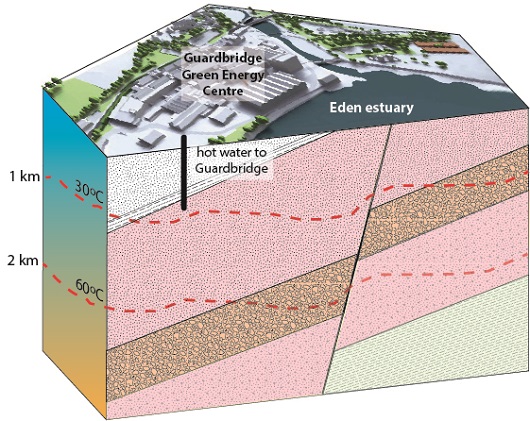Geothermal energy could heat homes and businesses around Scotland

A green energy centre in Fife is to investigate the feasibility of heating buildings using warm water recovered from sedimentary rocks deep below the ground. The University of St Andrews, which operates the Guardbridge Energy centre, is lead partner in a Scottish Government funded project to see if geothermal energy can be used to heat homes and businesses around Scotland.
This largely untapped resource could provide significant amounts of renewable heat for Scotland, helping to reduce greenhouse gas emissions with a low carbon heat source.
Dr Ruth Robinson, the lead for the geothermal feasibility project at the University of St Andrews, said: “Extracting geothermal heat from sedimentary rocks is similar to getting drinking water out of the ground, except in this case the water is warm enough to be used for heating. This feasibility project will investigate if there is a business case to explore for geothermal heat, and if feasible, the technological developments arising out of this project could be used for similar projects across Scotland.”
The team of collaborators working on the project with the University’s Department of Earth and Environmental Sciences are part of a group called Fife Geothermal, and include the British Geological Survey, Ramboll, Town Rock Energy Ltd, Fife Council, and Resource Efficient Solutions Ltd.
The award to the Guardbridge project has been made from the Scottish Government’s Geothermal Energy Challenge Fund, supported by the Low Carbon Infrastructure Transition Programme, the first strategic intervention established under the new European Structural Funds programme.
Councillor John Wincott, Sustainability Champion for Fife Council, said: “Reliable, secure and affordable energy is important for Fife both for our communities and for business. Crucially, heat makes up over half the energy we use, so Fife Council is keen to support work to find local sources of renewable heat. Fife looks a good area for geothermal heat – that is basically hot, wet rocks – that could potentially supply the heat source to provide hot water and heating to local homes and businesses. We are therefore delighted to be a member of the Fife Geothermal group, and to be a part of one of only five projects to secure funding from the Scottish Government to investigate opportunities around Guardbridge.”
University of St Andrews Executive Director for Guardbridge, Ian McGrath, said:
“This is an exciting project, the potential to heat buildings from warm water underground is one of many renewable energies being considered for Guardbridge. As one of Europe’s leading research institutions, we encourage innovative concepts in renewable energy and wish Fife Geothermal every success. We believe the diverse range of potential uses for Guardbridge has the capacity to re-establish this huge site as a key economic centre in Fife.”
St Andrews University is investing £25 million at the former paper mill at Guardbridge to generate power through clean biomass and pump hot water four miles underground to St Andrews to heat and cool its labs and residences.
Alongside plans for a six-turbine wind power development at Kenly to the east of St Andrews, the Guardbridge scheme will support a strategic drive by St Andrews to become the United Kingdom’s first carbon-neutral university.
The University of St Andrews is also a partner in a second Geothermal Energy Challenge Fund project, led by ARUP, that will be centred at the new Aberdeen Exhibition and Conference Centre. At this site, the target heat resource is about 1km underground in one of the city’s famous granites.
Notes to news editors:
Fife Geothermal is a consortium group that was established in May 2014 as a strategic, catalytic tool for developing the region’s natural sources of geothermal energy. The group comprises representatives from the University of St Andrews, the British Geological Survey, Fife Council, Town Rock Energy Ltd, and Ramboll, as well as Scottish Enterprise and Green Business Fife. Resource Efficient Solutions (RES) is a Limited Liability Company, owned by Fife Council. RES offers high quality environmental consultancy and resource management services. Town Rock Energy Ltd is a consultancy firm specialising in mine-water and hot sedimentary aquifers heat potential and engineering. Ramboll is a leading engineering, design and consultancy company founded in 1945, employing over 12,000 experts in the UK, Europe, and overseas. The British Geological Survey is the UK’s premier provider of geoscientific data, information and knowledge for wealth creation, sustainable use of natural resources.
Dr Robinson is available for interview. Contact Communications Office.
Wider information on Guardbridge redevelopment should be addressed to Ian McGrath ([email protected]).
For more information about Fife Geothermal, please contact: Iain Todd on [email protected] (general enquiries) or Karen Grant on [email protected] (media enquiries)
Issued by the University of St Andrews Communications Office, contactable on 01334 467310 or [email protected]
Category Research